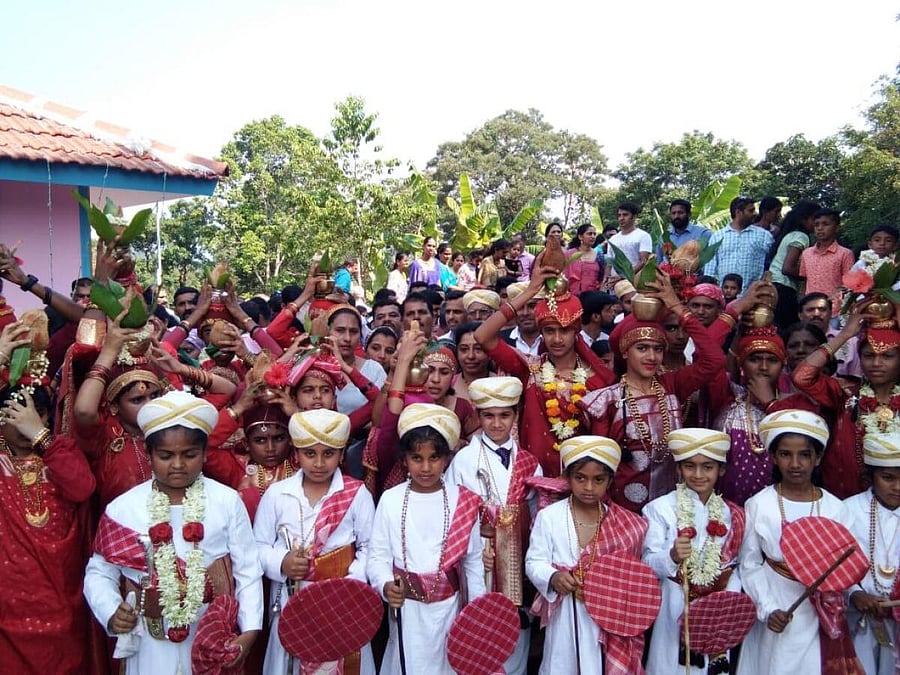
The months of March, April and May witness many annual village temple festivals happening in Kodagu. The temple idols called ‘thadamb’ are carried by a priest on the head, in processions. ‘Therays’ (shaman dances), where performers wear colourful red costumes and imitate deities or ancestors, are organised in temples and ancestral homes of some clans.
The main festivals are the Bhagwathi Namme and the Boad Namme, which are held in honour of village deities. Two such temple festivals were held in the second week of April this year. One was at the Puthu Bhagwathy temple in Birunani village. The other was at Pannangalatamme in Yavakapadi village.
During the Puthu Bhagwathy festival, the people of Birunani make vows to the goddess in order to fulfil their wishes, often for the good health of their children. The celebrations include a ceremony similar to a wedding ritual, with the boys dressed as brides and the girls as grooms.
Legend has it that once five sibling gods — two brothers and three sisters — came to South Kodagu from Kerala. The eldest brother Mattlappa settled in Mathur near Ponnampet. The eldest sister Puthu Bhagwathy settled in Birunani. The younger brother Ogerelappa settled in the forests of Ogerelappa. The youngest sisters, twins, settled in Rudraguppe near the Kammaratappa temple and hill. They were known as Rudraguppelamme or Jodi Bhagwathy.
Members of the Kembatti, Kodava, Airi, Kudiya, Kaniya and other communities participate in the Pannagalatamme festival. They bring ‘bolle kall’ (toddy), umbrellas and other articles to the festival. A few members of the Kembatti community wear red or white ‘kuppyas’ (native coats) and perform ‘thirale’ or go into a trance.
The tale behind this festival goes as follows. Long ago, seven sibling gods — six brothers and one sister — lived in Kerala. The eldest brother settled in Tali Parambu and built a famous temple there. He sent his younger siblings eastward towards Kodagu to establish temples. Today, three of these other temples are in Kodagu, while the other three are in Kannur and Wayanad.
Four siblings came to Kodagu. The farm they were camping in belonged to the Pardanda joint family in Kunjila. The sister milked a cow belonging to the family which was grazing there. She used the milk to cook the rice. The rice was placed in a clay pot and buried in the hot sand beside a stream.
There were banana trees growing on the farm. The siblings cut a few leaves to use as plates. Ummavva of the Pardanda family saw this and scolded them. The sibling gods then cursed the family that no bananas would thereafter grow on their farm.
Muthanna, the head of the Pardanda family, then came and sought their forgiveness. But the curse took effect. However, the Pardanda were made the ‘deva thakka’ (hereditary temple managers) of the Igguthappa temple which was built in the nearby Padi hamlet.
Another brother settled in Palur and became known as Palurappa. The last brother settled in Thirunelli across the Kodagu border in Wayanad and is called as Pemmaiah.